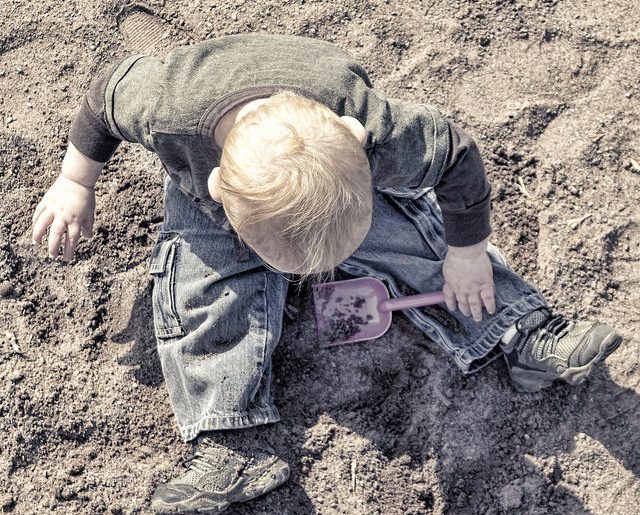A few days ago I posted up up an article on the possible dangers of using anti-bacterial soap and cleaning products. I have just come across another interesting article I saw at WellnessMama about the importance of getting dirty, especially if you are a kid!
Don’t get me wrong cleanliness is a good thing. Many diseases have been eradicated because of better hygiene. However, have we become overly obsessed with trying to create an almost hospital like sterile environment in our homes. Although, I must admit, I don’t think I am going to die of cleanliness anytime soon!
Now, Let’s Get Dirty!
This is mostly anecdotal, but on average gardeners tend to live 14 more years longer than a non gardener! One possible reason for this is gardeners get their hands dirty regularly and in doing so are exposed to the rich source of natural bacteria, minerals and microorganisms. The theory is that many of us rarely or never touch the earth with bare skin, and certainly not for extended periods of time. This leads to a build up of positive electrons in the body from electrical energy, electromagnetic frequencies, WI-FI and more. The earth acts as a ground, just as it does for electrical outlets, reducing the extra positive charge.
The theory is that this build-up and lack of contact with the earth can lead to inflammation and disease. Gardeners, by touching the earth are “grounding” themselves and removing this extra charge. Yes, I know, some will cry pseudo-science. But it’s an interesting theory nonetheless.
Why Dirt is Important for Kids
So what does it mean for our kids? It means that all of our cleaning, disinfecting and sterilizing could be doing more harm than good at times.
Much to the chagrin of their mothers (and my husband!), babies have a natural desire to play in the dirt and put dirty objects in their mouth. Turns out, this could have an important immune developing purpose:
“What a child is doing when he puts things in his mouth is allowing his immune response to explore his environment,” Mary Ruebush, a microbiology and immunology instructor, wrote in her book, Why Dirt Is Good: “Not only does this allow for ‘practice’ of immune responses, which will be necessary for protection, but it also plays a critical role in teaching the immature immune response what is best ignored.”
After a study found that kids who grew up on farms or with a dog in the house had fewer allergies, research started to explore the importance of the organisms found in these less-than-sanitized environments and how they impacted health.
“One leading researcher, Dr. Joel V. Weinstock, the director of gastroenterology and hepatology at Tufts Medical Center in Boston, said in an interview that the immune system at birth “is like an unprogrammed computer. It needs instruction.”
He said that public health measures like cleaning up contaminated water and food have saved the lives of countless children, but they “also eliminated exposure to many organisms that are probably good for us.”
“Children raised in an ultra clean environment,” he added, “are not being exposed to organisms that help them develop appropriate immune regulatory circuits.”
Studies he has conducted with Dr. David Elliott, a gastroenterologist and immunologist at the University of Iowa, indicate that intestinal worms, which have been all but eliminated in developed countries, are “likely to be the biggest player” in regulating the immune system to respond appropriately, Dr. Elliott said in an interview. He added that bacterial and viral infections seem to influence the immune system in the same way, but not as forcefully.”
Additionally:
“In the June 2012 issue, The Journal of Allergy and Clinical Immunology published a study that demonstrated that Amish children who grew up on farms in northern Indiana had significantly lower rate of allergies than non-farm populations (5.2% for Indiana Amish populations, 11.3% for non-farm Swiss populations). This is called “the farm-effect” and has been documented in farm populations across North America and Europe, with a 50% reduction in allergic occurrence in farm children.
In the United States, the third National Health and Nutrition Examination Survey found 54.3% of the study population to have evidence of allergic sensitization to at least one thing.
A recent study shows that the Amish have a lower incidence of asthma and allergies than non-farm populations.
Add to that the results of a study American Journal of Respiratory and Critical Care Medicine published in 2007 that shows the use of cleaning sprays 4 times a week caused an increase in asthma and you can start to see the problem. Sprays that were included in the increase in asthma were glass-cleaning, furniture and air freshening sprays.”
Continue on the next page






